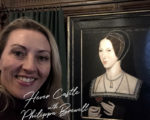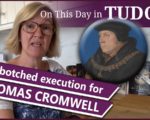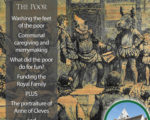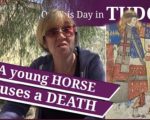
In an exclusive visit, our roving reporter, Philippa Brewell, was able to go and film in Hever Castle, Kent.
[Read More...]
In an exclusive visit, our roving reporter, Philippa Brewell, was able to go and film in Hever Castle, Kent.
[Read More...]
On this day in Tudor history, 20th October 1557, or possibly 21st, courtier Mary Arundell died at Bath Place in London.
Mary is an interesting Tudor lady. Not only did she serve at least two of Henry VIII’s wives, but she was a countess twice over, having been married to both the Earls of Sussex and Arundel. She has also been confused with two other Tudor ladies, and we don’t know whether the portrait you see in the thumbnail is really her.
Find out more about Mary Arundell’s life, court career and those of her husbands, in today’s talk.
[Read More...]
On this day in Tudor history, 4th October 1507, Sir Francis Bigod, was born at Seaton, in Hinderwell, Yorkshire.
Bigod led an uprising in Yorkshire in January 1537, Bigod’s Rebellion, after the rebels of the Pilgrimage of Grace had been dispersed. But who was Bigod? Why would an evangelical reformer become involved with the Pilgrimage of Grace? What was his rebellion about and what happened to him?
Find out more about Sir Francis Bigod and Bigod’s Rebellion in today’s talk.
[Read More...]
On this day in Tudor history, 22nd September 1560, Amy Dudley (née Robsart), wife of Robert Dudley, Earl of Leicester, was buried in the chancel of the University Church of St Mary the Virgin, Oxford.
Amy had been found dead at the foot of the stairs of her home and the subsequent inquest had ruled her death as caused by “misfortune”. She was buried in a lavish ceremony which cost her widower over £2,000.
Find out more about her burial, and who attended, in today’s talk.
[Read More...]
On this day in Tudor history, 20th September 1586, Anthony Babington, John Ballard, John Savage, Chidiock Tichborne and three other conspirators were executed near St Giles-in-the-Fields in London.
They suffered full traitors’ deaths, being hanged, drawn and quartered, after being found guilty of treason for plotting to assassinate Queen Elizabeth I in the famous Babington Plot, which sought to replace Elizabeth with Mary, Queen of Scots.
Find out more about Anthony Babington, the Babington Plot, the men involved, how it was discovered, and how it led to Mary, Queen of Scots’ execution, in today’s talk.
[Read More...]
On this day in history, 25th August 1554, Thomas Howard, 3rd Duke of Norfolk, magnate, soldier and uncle of Queens Anne Boleyn and Catherine Howard, died of natural causes at his home of Kenninghall in Norfolk. He was laid to rest in St Michael’s Church, Framlingham, Suffolk.
Find out more about this important Tudor man, and how he escaped the axe-man and died at a good age in his bed, in this talk.
[Read More...]
On this day in Tudor history, 24th August 1507, Cecily of York, Viscountess Welles, died at Hatfield in Hertfordshire. She was buried at “the friars”.
Cecil was, of course, the daughter of King Edward IV and his queen consort, Elizabeth Woodville, and the sister of Elizabeth of York and the Princes in the Tower, but there’s far more to her than that.
Did you know that she married without permission and had to be sheltered by Lady Margaret Beaufort?
Find out all about Cecil of York’s life in today’s talk.
[Read More...]
On this day in Tudor history, 16th August 1599, soldier and Lord President of Munster in Ireland, Sir Thomas Norris, died at his home, Mallow Castle, in Cork, as a result of an injury he’d sustained in a skirmish with Irish troops on 30th May 1599. His brother, Henry, died just five days later. Thomas’s brothers, John, William and Maximilian, who were also soldiers, died in 1597, 1579 and 1593 respectively.
Queen Elizabeth I recognised the sacrifice of this family and wrote a letter of condolence to her friends, Henry Norris, 1st Baron Norris, and his wife, Margery Williams. Find out what she wrote to the grieving couple in today’s talk.
[Read More...]
On this day in Tudor history, 4th August 1549, in the reign of King Edward VI, the Battle of Woodbury Common, part of the Prayer Book Rebellion, took place on Woodbury Common, near the village of Woodbury in East Devon.
The battle was between the rebels and the crown troops commanded by John Russell, 1st Earl of Bedford. Although the rebels fought valiantly, they were defeated.
Find out more about the battle and what caused the Prayer Book Rebellion of 1549 in today’s talk.
[Read More...]
On this day in Tudor history, 3rd August 1562, Essex magnate and notorious rake, John de Vere, 16th Earl of Oxford, died at his home, Hedingham Castle in Essex.
Oxford served four Tudor monarchs and was great chamberlain at the height of his career, but he had a rather colourful reputation. Find out more about the life of this Earl of Oxford and what gave him his reputation in today’s talk.
[Read More...]
On this day in Tudor history, 28th July 1540, the same day that Henry VIII married Catherine Howard, Thomas Cromwell, Earl of Essex, the king’s former chief advisor, was beheaded on Tower Hill having been found guilty of corruption, heresy and treason.
Find out about Cromwell’s botched execution and his execution speech in today’s talk.
[Read More...]
On this day in Tudor history, 14th July 1575, evangelical reformer and translator, Richard Taverner, died at Woodeaton in Oxfordshire. He was laid to rest in the parish church at Woodeaton.
Richard Taverner is mainly known for his Bible translation, “Taverner’s Bible”, but there is far more to him than that, including his time as Thomas Cromwell’s chief propagandist.
Find out all about Richard Taverner’s life and career in today’s talk.
[Read More...]
On this day in Tudor history, 9th July 1553, three days after the death of her half-brother, King Edward VI, and the day after she’d proclaimed herself queen at her estate at Kenninghall, Mary (future Mary I), daughter of Henry VIII and Catherine of Aragon, wrote to the late king’s privy council regarding “some evil” that she’d heard.
But what was going on? What had Mary heard and what was she going to do about it?
Find out more about the situation and Mary’s letter in today’s talk.
[Read More...]
On this day in Tudor history, 4th July 1551, Gregory Cromwell, 1st Baron Cromwell, died of sweating sickness at Launde Abbey in Leicestershire. He was laid to rest at the abbey’s chapel on 7th July.
Gregory Cromwell was the son of the more famous Thomas Cromwell, but what do we know about him and what happened to him after his father’s fall in 1540?
Find out about the life and career of Gregory Cromwell in today’s talk.
[Read More...]
On this day in Tudor history, 9th or 10th June 1563, William Paget, 1st Baron Paget, diplomat and administrator, died, probably at his estate of West Drayton in Middlesex.
By his death, he’d served four Tudor monarchs and even though he’d fallen from favour and been imprisoned, he kept his head and climbed back in favour.
But who was Baron Paget? Well, let me give you a few facts about this Tudor man.
[Read More...]
Thank you to Tudor Society members who also subscribe to the Anne Boleyn and Tudor Society YouTube Channel – we’ve just hit 45,000 subscribers!
To celebrate, I jumped at the opportunity to humiliate Tim with another Tudor History Challenge. This time, it’s on the six wives of Henry VIII.
Why don’t you play along and see if you can do better than Tim?
[Read More...]
This month’s magazine is all about the Tudor poor, and it’s 82 pages long packed with great articles!
[Read More...]
On this day in Tudor history, 1st May 1551, in the reign of King Edward VI, Norfolk landowner and Member of Parliament, Sir Edmund Knyvet, died.
Knyvet had an interesting court career, being helped by his Howard connections, but he was known for his rather hot temper, which nearly led to him losing his right hand.
Find out more about hot-tempered Sir Edmun Knyvet in today’s talk.
[Read More...]
On this day in Tudor history, 30th April 1544, in the reign of King Henry VIII, Thomas Audley, Baron Audley of Walden and Lord Chancellor, died at his home in London.
Audley was Thomas Cromwell’s right-hand man in 1536, during the fall of Anne Boleyn, and became even more important after Cromwell’s fall.
Find out more about Thomas Audley, an important Tudor statesman, and how he served King Henry VIII, in today’s talk.
[Read More...]
On this day in history, late on 26th March 1603, two days after the death of Queen Elizabeth I, Sir Robert Carey arrived at Holyrood in Edinburgh, Scotland, to inform King James VI that Queen Elizabeth I was dead and that James was now king.
It took Carey just two days to get from London to Scotland, and he had an accident on the way, but it was all worth it. Find out about his journey and what happened in today’s “on this day in Tudor history” talk.
[Read More...]
On this day in Tudor history, 19th March 1568, Elizabeth Seymour, Lady Cromwell, died. She was around fifty years old at her death.
Elizabeth was the sister of a queen, and a lord protector, and two of her brothers were executed as traitors, but what else do we know about Elizabeth Seymour and how is she linked to the Cromwell family and a portrait once thought to be of Queen Catherine Howard?
Find out more in today’s talk.
[Read More...]
On this day in Tudor history, 13th March 1540, sixty-eight-year-old Henry Bourchier, 2nd Earl of Essex, died after suffering a broken neck in a horse-riding accident. Chronicler Charles Wriothesley recorded: “the Earl of Essex, riding a young horse, by misfortune cast him and brake his neck at his place in Essex, which was great pity.”
Henry Bourchier, 2nd Earl of Essex, was related to the royal family and served both Henry VII and Henry VIII. Find out more about this Tudor man in today’s talk.
[Read More...]
On this day in history, 18th February 1612, Italian banker Roberto di Ridolfi died in Florence, Italy, aged 80.
Amazingly, he died a natural death even though he’d been the brains behind the Ridolfi Plot, a plot to depose Queen Elizabeth I and to replace her with Mary, Queen of Scots, thereby restoring Catholicism in England.
Find out more about Ridolfi and his famous plot in today’s talk:
[Read More...]
On this day in Tudor history, 27th January 1606, in the reign of King James I, the eight surviving conspirators of the November 1605 Gunpowder Plot were tried at Westminster for high treason.
Why am I talking about something that happened during the reign of King James I, in the Stuart period? Well, because the Gunpowder Plot actually had its origins in Elizabeth I’s reign.
Let me tell you more in today’s talk.
[Read More...]
On this day in Tudor history, 19th January 1601, Henry Herbert, 2nd Earl of Pembroke, died at Wilton, the family home near Salisbury.
Who was Henry Herbert?
Let me tell you about this interesting Tudor man in today’s talk.
[Read More...]
Happy Epiphany! Happy Kings’ Day! Yes, today is the Feast of the Epiphany, the day that commemorated the visit of the Magi to the Christ Child.
Following on from yesterday’s Teasel’s Tudor Trivia about Epiphany Eve and Twelfth Night Cake, I thought I’d share with you some examples of how Epiphany was celebrated at the royal court. Find out what those Tudor people got up to on Twelfth Night in today’s talk.
[Read More...]
On this day in Tudor history, 3rd January 1521, Pope Leo X excommunicated Reformer, German priest and professor of theology Martin Luther from the Catholic Church.
In today’s talk, I explain what led to Luther’s excommunication, what happened when Luther was called to the Diet of Worms, and what happened next to this famous Reformer.
[Read More...]
On this day in Tudor history, Wednesday 4th October 1536, trouble erupted in Horncastle, Lincolnshire. This was part of what we know as the Lincolnshire Rising which, in turn, was part of the famous Pilgrimage of Grace rebellion.
In today’s talk, I share exactly what happened in Horncastle, which included two murders, what the rebellion was all about, and how King Henry VIII responded to the rebel’s grievances. I read King Henry VIII’s own words to the rebels of the Pilgrimage of Grace.
[Read More...]
On this day in Tudor history, 20th September 1486, King Henry VII’s wife, Elizabeth of York, gave birth to the couple’s first child at Winchester.
The baby was a boy and was baptised Arthur, named after the legendary King Arthur. There were high hopes for this boy and King Henry VII believed that his firstborn would be a powerful king who would bring a golden age to the country. Of course, things wouldn’t go according to plan.
Find out more about Arthur Tudor, Prince of Wales, who was, of course, Catherine of Aragon’s first husband, in today’s talk from Claire Ridgway, founder of the Tudor Society.
[Read More...]
As usual, we have two live chats this month, an informal one and a Q&A session with our expert speaker, Sarah Morris.
Both chats will take place in the Tudor Society chatroom. They wll last an hour.
Our informal live chat is on Tudor childhood and will take place on Saturday 24th August. The idea of the informal live chats is for members to dive in with their comments, opinions, book recommendations etc. and to pose questions to each other on the topic. Anything that is topic-related. Claire attends to moderate, and to take part too. We can talk about childhood, education, upbringing, children in different classes, toys, all sorts!
[Read More...]